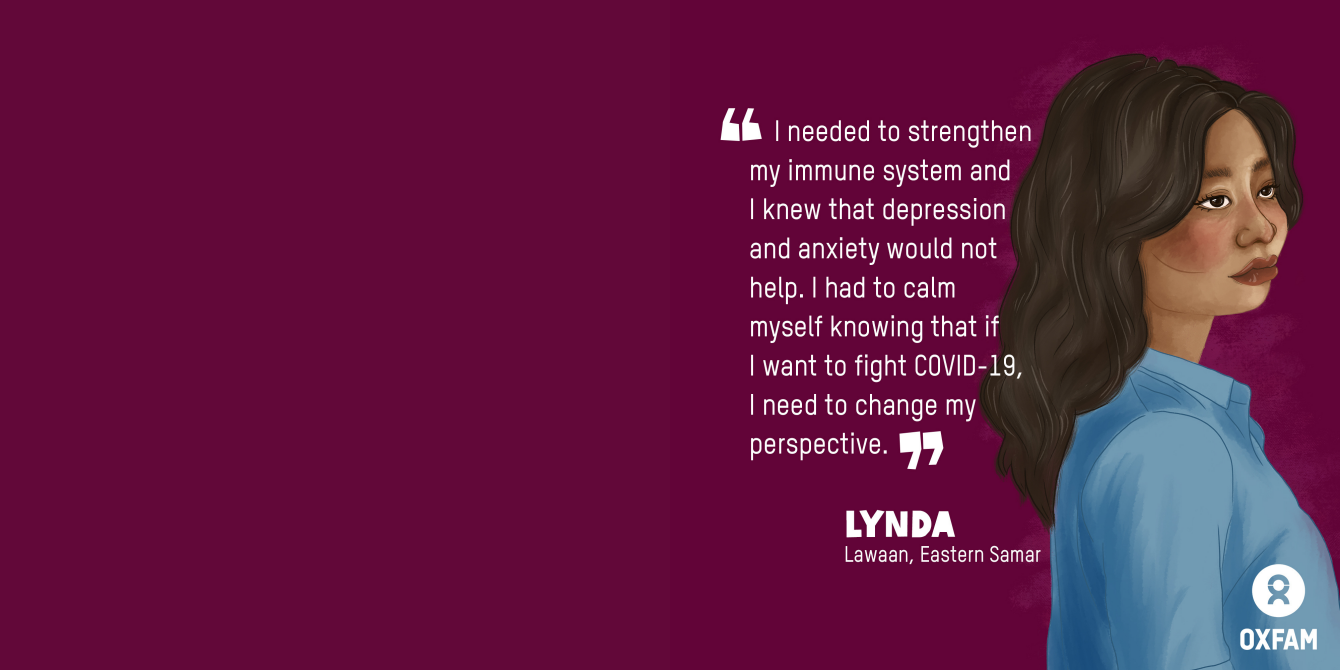
Lynda, HBCC Stigma Stories (Illustration: Vina Salazar/Oxfam)
Stigma Stories: A Change in Perspective
Thoughts of loneliness and anxiety ran through Lynda’s mind as she volunteered herself to enter into self-isolation. What transpired not only disrupted her work, but meant not being able to attend to the child she was breastfeeding.
Everything happened fast. Just a few days ago, she had high energies because the NGO which she worked with had mobilized funds to provide livelihood assistance to some of the most indigent members of her town. An event was organized and it was well-attended. Until news came that one of her colleagues, whom she had contact with prior to the event, was a suspected patient because her sister had tested positive for COVID-19.
Lynda could not help but worry. What if her colleague was found to be positive? What if she was infected? And what if she had passed it on to someone else? She agonized over these thoughts; if these were all true, she would not be able to stop blaming herself for causing harm to her already burdened neighbours.
But Lynda knew she had to act quickly. That same day, she decided to isolate herself from her husband and children, and asked them to stay at her mother’s house as she awaited her colleague’s test result.
While alone, the 31-year-old mother knew she had to push herself to cope with and win over her situation. “I needed to strengthen my immune system and I knew that depression and anxiety would not help. I had to calm myself knowing that if I want to fight COVID-19, I need to change my perspective.”
On the first night of her home quarantine, she was visited by the Barangay Chairman and her mother, who was also a member of the Barangay’s Committee on Health. Both were assigned to monitor her health during the her self-isolation. She was asked to routinely take her body temperature and immediately report any symptoms of possible infection. The Municipal Health Officer (MHO) was also informed of her situation and readily gave health advice and further monitoring guidance. Over the next two days, follow-ups were conducted using online messaging.
The news came on the fourth day that her colleague’s sister was confirmed to test positive, again, for COVID-19. This almost dashed Lynda’s hopes and brought her overwhelming anxiety. But the thought of reuniting with her family was far more powerful than her worries. “I refused to panic,” she said.
She knew that whatever happens, there are people in her community— her support system—whom she can lean on and draw strength from; and that she had to trust the advice of the Barangay Health Emergency Response Teams (BHERTs) and the health experts of her town knowing that they base their judgment on facts rather than misleading information which only make people believe that they are helpless against COVID-19.
The next day, she received news that her colleague tested negative, relieving her of the stress she has experienced in the past days. The Barangay Chairman went to her home to relay the Municipal Health Office’s (MHO) message that her selfisolation was over.
“I realized the importance of informing the local authorities and following the advice of the BHERTs and health experts for the safety of our families and everybody,” Lynda shared.
Part of the HBCC intervention is to support the local government units (LGUs) in building their capacity on how to improve their COVID-19 prevention and management. PRRM has been working with Quinapondan and Lawaan LGUs where COVID-19 case/s were existing.
*Lynda’s real name withheld
 Follow us on Facebook
Follow us on Facebook Instagram
Instagram Follow us on Twitter
Follow us on Twitter LinkedIn
LinkedIn